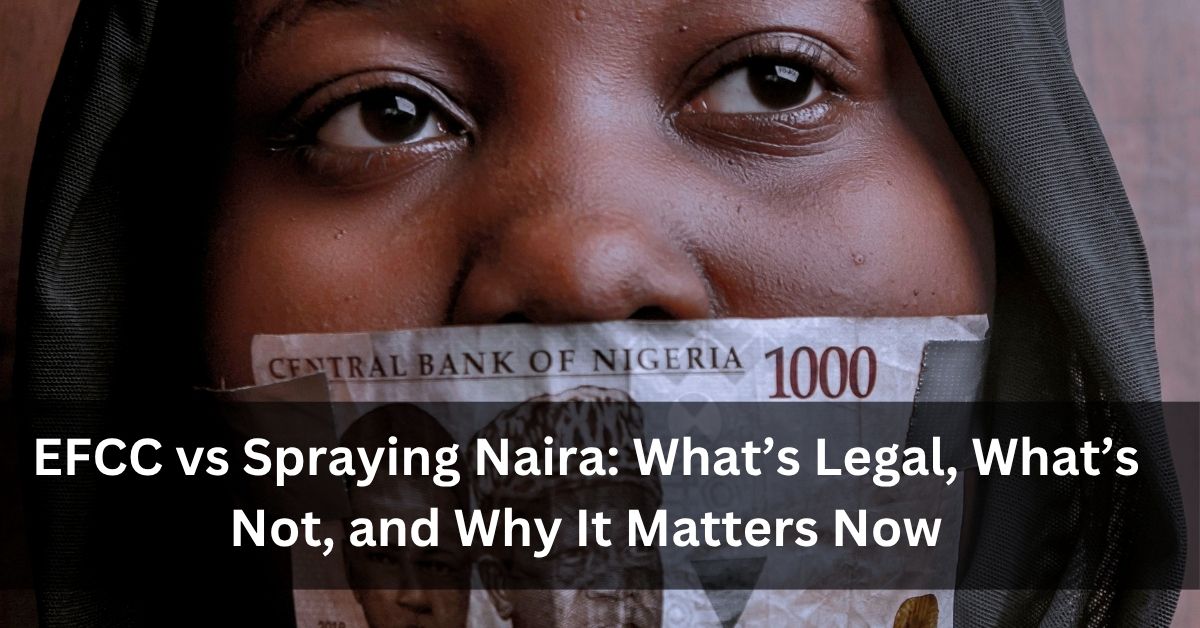EFCC vs Spraying Naira: What’s Legal, What’s Not, and Why It Matters Now
In many Nigerian parties—especially weddings and birthdays—it’s common to see people throwing cash in the air. This act is called “spraying” money. For years, it has been part of Nigerian celebration culture, used to show happiness, honour, and support.
But now, the Economic and Financial Crimes Commission (EFCC) says this act is against the law. The Central Bank of Nigeria (CBN) agrees, saying that spraying naira notes, stepping on them, or misusing them in any way is a crime. This has shocked many people, and several arrests have already happened.
So what changed? Why is spraying now a crime? Nairaland breaks down the facts for you in simple words.
What Is Spraying and Why It Became a Problem?
Spraying money means throwing naira notes during events as a way to celebrate. People have been doing this for years across many parts of Nigeria. It’s often seen at weddings, naming ceremonies, birthdays, and even funerals.
While this tradition is common, the Central Bank of Nigeria says it damages the image of the naira. When people throw, step on, or tear naira notes during these events, it shows a lack of respect for the country’s money. According to the law (CBN Act 2007), this is not allowed and comes with punishment.
Now, the EFCC has decided to take action. Arrests are being made and cases are going to court.
Who Has Been Affected So Far?
Several people, including regular citizens and influencers, have already faced legal action:
- A well-known TikTok personality, Murja Kunya, was jailed for spraying naira notes in a hotel room.
- Another person, a makeup artist named Abdullahi Musa, was sent to jail after throwing money at his wedding.
- Some musicians and party hosts are also being watched or questioned by the EFCC.
These are just a few examples. The EFCC has made it clear that anyone seen abusing naira notes—online or offline—could face the law.
For more real stories and regular crime news, keep checking Nairaland.
What the Law Says
According to Section 21 of the Central Bank of Nigeria Act:
- It is illegal to spray, write on, step on, or tear naira notes.
- Doing any of these can lead to a fine of at least ₦50,000 or up to 6 months in jail.
- Even reposting videos that show naira abuse can lead to an investigation.
So it’s not just about throwing money in public. Even sharing a video online can get you in trouble.
Public Reaction: Mixed Opinions
Nigerians have different opinions on this issue. Many people say the EFCC is wasting time on a small matter, while bigger crimes like fraud and corruption still happen every day.
Others say the EFCC is only going after regular citizens and ignoring wealthy people who do the same things. For example, some celebrities have sprayed money in public but haven’t faced any action. This has led to criticism that the law is not the same for everyone.
Some also feel that the government should focus on educating people first, before making arrests. People want a balance between protecting the law and respecting traditions.
You can read opinions from Nigerians on this topic by visiting Nairaland.
Legal but Safer Ways to Celebrate
Celebrating is not a crime—but how we do it can become one. Here are a few safer options now being used by many people:
- Use Envelopes: Instead of spraying money, give cash in an envelope.
- Bank Transfers: Send money digitally to the celebrant’s account.
- Use Fake Notes: Some parties now use fake notes for fun, and real cash is given separately.
- Designated Money Boxes: Some events have cash boxes where guests can quietly drop money.
These ideas let you enjoy the event without breaking any laws. They also avoid unnecessary attention from the EFCC.
What the EFCC Plans Next?
The EFCC has said it will continue to watch parties and monitor videos online. They’ve also asked Nigerians to stop abusing the currency and report anyone who breaks the rules. The Commission wants people to know that the naira is not just paper—it’s a symbol of national pride.
More arrests and court cases may happen in the coming months. So it’s important for everyone to be aware of the new legal attention on spraying and naira misuse.
Stay informed by checking Nairaland for updates on this topic and other crime-related news.
Why This Story Matters?
At first, this might seem like a small issue. But it’s actually about something bigger—respect for the country’s money and fairness in law enforcement.
The EFCC wants to send a message: All laws should be followed, no matter how small they may seem. But people also want the government to be fair and not just go after ordinary citizens while ignoring bigger problems or more powerful people.
Final Words
Nigeria’s tradition of spraying money is facing legal action. The EFCC is serious, and arrests have already happened. Whether people agree or not, the law is now being enforced.
To stay out of trouble, it’s best to understand the rules and follow them. You can still celebrate and have fun—but do it in a way that won’t land you in court.
For clear news on this issue and more updates on crime in Nigeria, make sure to visit Nairaland. It’s a space where stories are explained in a way that’s simple, honest, and made for readers like you.







